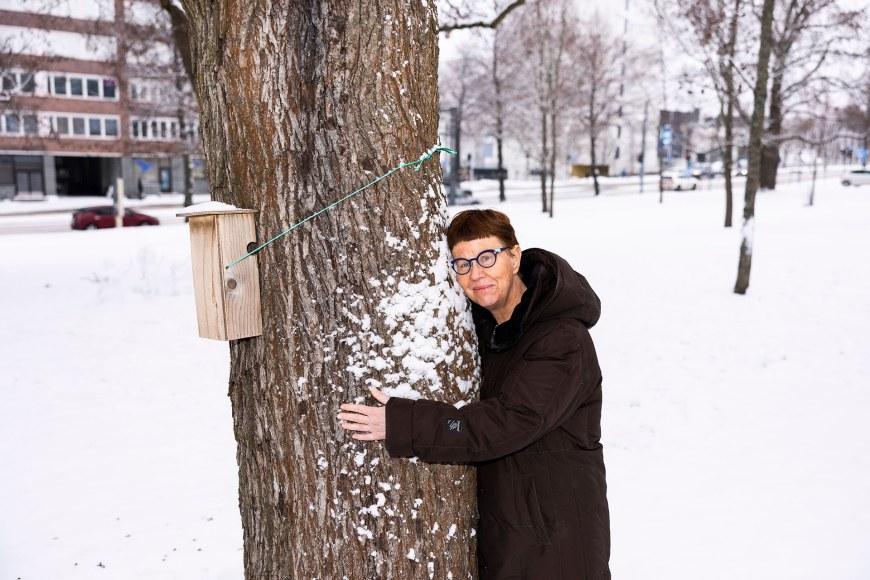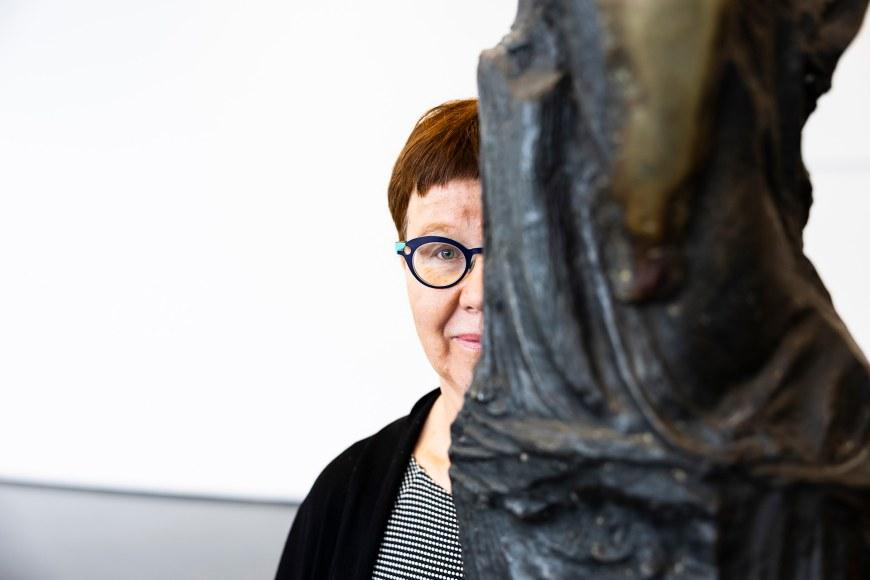Is warfare compatible with feminine values?

This article was originally published in Unit, the magazine of Tampere Universities.
Armed warfare is strongly associated in the mind with men. Yet in many countries, even a significant number of women serve as soldiers. Our historical image of women in arms is also changing. Women have, for example, recently been found buried as high-ranking Viking soldiers.
The number of women in battle missions varies greatly from country to country. In Norway, women are now also subject to compulsory military service. Thus, up to a quarter of the strength of the Norwegian armed forces are women. In the US professional army around 16 % of those serving are women. Women currently make up around 1–2% of the Finnish conscript force.
Army as a safety net
Reasons for women joining the military vary widely from country to country.
“The United States has rather thin social safety nets, so the military is one way for poor people to get a job or vocational training,” Tarja Väyrynen, Professor of Peace and Conflict Research at Tampere University, says.
“Especially for women in poor neighbourhoods in the US, the military often acts as an emancipatory factor, i.e., a path to a better future,” she explains.
In Finland, the reasons for joining the military are probably due to the growing collective will to defend the nation and the advancement of gender equality. For some reason, the number of applicants for conscription has been on the rise, especially since 2017. While the lowest number of female applicants in Finland in 2006 was only 430, the record year of 2021 saw 1675 applicants. This year, there were 1,588 applicants.
Raising the status of non-military service
Should we increase the number of women in the military and slowly get rid of the gendered idea of only men as soldiers? After all, not all men want to join the army, so would it not make sense to have the people who are the most soldierly in character, regardless of their gender, in the military service and reserve?
From a gender perspective, Väyrynen would like to see a more even sex ratio in the Defence Forces.
“In addition, it would be very welcome from a gender equality perspective to see the status of men’s non-military service raised to a more prestigious level. It should be seen by men as serving the nation in the same meaningful way as armed national defence,” Väyrynen says.

Women’s warfare is often opposed on the grounds that war and killing are not compatible with so-called feminine values. In Väyrynen’s view, these so-called feminine values are, of course, important in keeping peace and peacebuilding in societies.
“Yet I do not think that the values that are described as feminine or masculine really need to be linked to people’s gender anymore,” she points out.
“Equality must be ensured”
According to Väyrynen, although it is already possible for women to pursue a career in the Defence Forces, the institution still has a lot of work to do to ensure that there is true equality for all conscripts.
“When you read the experiences of Finnish women who have served or joined the army, they seem very polarised depending on where they serve,” Väyrynen says.
“There are women for whom joining the army has been a significant and important experience, but for some of them it has been a terrible disappointment. For them, the army has turned out to be a sexist place, where all the rudimentary and stereotypical things about women’s and men’s places and roles in the world have been shouted,” she points out.
In Väyrynen’s view equal treatment should become the norm in the Defence Forces not only for women but also for other minority groups such as soldiers with an immigrant background, Roma, members of sexual minorities and people of other genders.
“In a word, the Finnish Defence Forces as an institution must be brought into the 21st century in terms of equality,” Väyrynen summarises.
Women peacemakers
All wars come to an end. Then begins the long process of peace and rebuilding of societies. The involvement of women in these phases is so essential that it is laid down in UN Resolution 1325. The resolution commits member states to involve women in all phases of the peace process, from peacekeeping to negotiating tables to reconstruction.
According to Väyrynen, women can be already seen involved in negotiations, but there are still many obstacles to genuine participation.
“Often, women are simply placed at the negotiating table for the sake of appearances and their role is reduced to representation. In many national dialogue processes, I have seen women concretely sitting on the sidelines, unable to participate in important discussions,” she points out.

Those peace processes in which women have been equally involved have been shown to have a higher percentage of success.
“The result is probably due to the fact that in these negotiations the field of social issues has been better covered from the very beginning of the process,” Väyrynen says.
“Why should half the population remain silent in processes that are about making the future of society as a whole? Of course, it is not always easy to give women a voice at local level for cultural reasons, especially in very old cultures. But women’s participation must always be pursued with determination and perseverance,” she emphasises.
The West’s self-censorship as an obstacle
In international negotiating roles, the West’s own prejudices against other cultures can act as a self-censorship and prevent women from being selected for challenging negotiating roles. This is despite the West’s commitment to gender equality and the fact that women have shown themselves capable of achieving remarkably good negotiating results even with cultures with highly traditional gender roles.
Väyrynen mentions, for example, the extremely difficult Iran nuclear deal that was reached in 2015. Three women from the West were at the centre of the negotiations: EU diplomat Federica Mogherini, top nuclear weapons technology expert Helga Schmid and American diplomat Wendy Sherman.
Such a number of women in the top negotiation was unprecedented, but the skill of the trio in reaching a very complex agreement was greeted with considerable acclaim. In interviews, the women also said that they had not experienced any kind of belittlement from the Iranian representatives on account of their gender. Only the handshakes at the end of the negotiations were omitted for religious reasons.
When asked about a personal interest in a military career or work as a peace negotiator, Väyrynen says, that a military career has never been on her mind, but the prevention of armed conflicts and understanding conflict and peace have interested her from a young age.
“I am happy to have spent my career in peacebuilding as a researcher and, of course, as a teacher,” Väyrynen says. “I like to think that my work will continue through our wonderful students. Our Tampere Peace Research Institute TAPRI graduates many experts who go on to work in peacebuilding in the field, for example in NGOs,” she adds.
Tarja Väyrynen
- Professor of Peace and Conflict Research at Tampere University.
- Has worked as a peace and conflict researcher throughout her career.
- Graduated from the University of Kent at Canterbury in 1991 with a Master’s degree in International Conflict Analysis and from the University of Tampere in 1993 in International Politics. Earned her doctoral degree at the University of Kent in 1995.
- Resigned last summer as Director of Research at TAPRI (Tampere Peace Research Institute), which she headed for 18 years. Tampere Peace Research Institute (TAPRI), under the auspices of Tampere University, is the only centre for peace and conflict studies in Finland.
Author: Tapio Ollikainen








